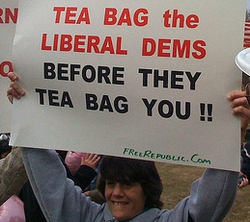Tea Time: What next for the tea party "movement?"
 This weekend, the tea party cause -- which exploded on the scene in opposition to the stimulus package and Wall Street bailouts last spring -- gets its closeup with its first major national meeting: The National Tea Party Convention in Nashville, Tennessee.
This weekend, the tea party cause -- which exploded on the scene in opposition to the stimulus package and Wall Street bailouts last spring -- gets its closeup with its first major national meeting: The National Tea Party Convention in Nashville, Tennessee.There's no denying that the tea partiers are a real political phenomenon. But the convention comes at a time of growing inner turmoil among key activists and looming questions about the movement's direction.
Here are four key issues to watch heading into the tea party confab this weekend:
1 - IS THERE A POPULIST IN THE BUILDING? Going to the tea party confab isn't for those of modest means: On top of a $560 registration fee, attendees are staying at the "luxurious" Gaylord Opryland Resort ($149/night + $25/day parking, conference rates). Tickets are sold out, but the curious can still buy a $349 ticket to see Sarah Palin keynote the convention banquet tomorrow, a gig that will net her $100,000.
For a movement focused on Washington excess, these big numbers have rankled many in the tea party ranks, as did news that the conference organizer -- Memphis-area DUI lawyer Judson Phillips -- saw the conference as a money-making venture.(Erick Erickson of the blog RedState: "I think it is a great con of people making money off the passions of others.")
Some of the sparring is just jockeying for position among self-anointed tea party leaders. But it also points to a real tension at the heart of the tea party, or any right-wing populist movement: the disconnect between the leadership, who aim to protect the interests of the wealthy, versus the realities of their less-privileged base, who must be persuaded that all of their economic hardships can be blamed on high taxes and big government.
As the tea party cause grows -- and as conservative leaders try to piggy-back on its success -- the disconnect will grow between groups like FreedomWorks, the slick DC operation with $8 million in annual revenues (2008 director's salary: $550,000), and grassroots outfits like Tea Party Patriots, a volunteer operation open to "anyone who identifies with the tea party movement."
2 - CAN THEY GET ORGANIZED? No one doubts they have passion. They also have a decent public image: A CNN poll this week found that one-third of the U.S. public has a favorable view of tea partiers.
But organizationally, the movement is a mess. Relationships between the 12 leading tea party groups have been increasingly marked by bickering and turf wars. Ned Ryun of American Majority's attacks on convention organizer Phillips are typical:
"Who is this guy? What are his motivations? And what gives him the credibility to try to step in and insert himself as a leader of the movement?"The big issue now is how to relate to the Republican Party. Tea partiers are bitterly divided on the question: GOP operatives want to absorb the activist energy and channel it towards electoral victories in 2010 and beyond; many grassroots activists want to stay independent.
These are dilemmas any opposition movement runs into: inside vs. outside, top-down or bottom-up, power vs. purity. But it's an especially big challenge for the tea partiers, a group born out of anti-Washington anger who balk at the idea of being turned into foot soldiers for a system they despise.
3 - WILL THE SOCIAL CONSERVATIVES TAKE OVER? So far, tea partiers have largely succeeded in maintaining peace between two wings of the conservative base: economic libertarians and "values voters." But they've largely done that by downplaying the latter's concerns over immigration, abortion and gay marriage; as Grover Norquest of Americans for Tax Reform noted, "[W]hen you talk to [tea party] leaders, they say, we just do economics. We don't do other stuff."
But yesterday, the "kick off speaker" opening the convention was Tom Tancredo, the former Colorado congressman who has become a controversial leader of the anti-immigration movement. In his speech, Trancredo thundered that "people who could not spell the word vote or say it in English put a committed socialist ideologue in the White House."
Such dalliances into the murkier swamps of nativism and divisive social debates may appeal to people like religious conservatives in the GOP base, but it also risks further splintering the cause and driving away independents.
4 - CAN THEY BROADEN THEIR BASE? Tancredo's presence also points to another problem for the tea partiers: Their narrow social base. If you watched the town hall protests last year, the profile of typical convention attendee might sound familiar. As Jay Newton-Small of Time reports:
Attendees were mostly white and older; there were more women than men. Some were Republicans, more were Independents. To a person they loved Sarah Palin. A couple were even Democrats.In our increasingly-diverse country, that means tea partiers are drawing from a shrinking base of voters and the public. Tennessee, where the conference is being held, has the fourth fastest-growing Latino/Hispanic population in the country. 17% of the state's population is African-American, and 55% of Tennesseans under age 30 voted for Barack Obama.
In other words, the tea partier's base of "old, angry and white" puts them on the wrong side of where our country is headed demographically. It also makes them easy to dismiss as sentimental conservatives: afraid of change, more interested in fighting to bring back the good old ways rather than shaping the future.
Tags
Chris Kromm
Chris Kromm is executive director of the Institute for Southern Studies and publisher of the Institute's online magazine, Facing South.
